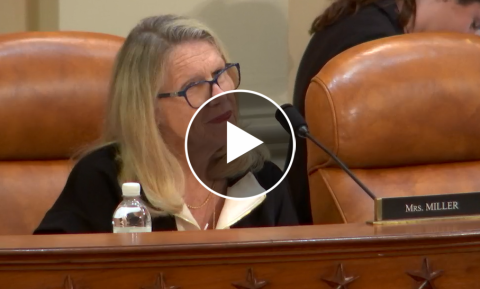Miller Participates in Ways and Means Hearing on Medicare Advantage
July 23, 2025
Washington, D.C. – Yesterday, Congresswoman Carol Miller (R-WV) participated in a Ways and Means Health subcommittee hearing discussing the Medicare Advantage program. The Congresswoman participated in an open dialogue about the success of the program, which covers the majority of West Virginia Medicare beneficiaries, and discussed areas that could be improved. A video and transcript of the Congresswoman's questions and provided responses can be found below.
Image

Congresswoman Miller began by discussing the growing number of Medicare Advantage enrollees both nationally and in West Virginia's First Congressional District and the factors leading to increased enrollment. “I appreciate the opportunity to discuss the Medicare Advantage (MA) program with you all today, especially as the program has grown with my generation nationally and in my district. West Virginia’s population is aging, and over a quarter of my home state’s population receives their healthcare through Medicare. Of those patients, 54 percent of West Virginians choose to enroll in Medicare Advantage plans. Patients in my district have gravitated towards MA plans because of their affordability and supplemental benefits they provide. The time and effort it takes to travel to a doctor is a key factor for many patients when deciding what type of plan to enroll in, so MA plans have become increasingly popular among patients that need transportation benefits," said Congresswoman Miller. The Congresswoman then discussed concerns regarding reimbursements to healthcare providers and asked Dr. David Basel, Vice President of Health Clinical Quality and Population Health Officer at Avera Health, how Medicare Advantage providers can better address those concerns and what can be done to provide additional benefits to rural patients. "As MA coverage has increased in West Virginia, we have unfortunately also heard some concerns from patients and providers around prior authorization and payments.” "Across the country, rural hospitals and healthcare providers report experiencing lower reimbursements from MA plans. This has led some providers to leave MA networks which then creates coverage gaps in rural areas. Dr. Basel, some quick questions. What can be done to ensure Medicare Advantage plans work with rural providers to allow beneficiaries to get the coverage they need?" asked Congresswoman Miller. "Particularly in the rural [areas], we are not as sophisticated at being able to fight on behalf of the prior authorizations. So, anything we are doing to streamline that process. You're hearing that same theme over and over again about transparency [and] efficiency. One of the things that I think is going to be helpful as we talk about this […] I’m a clinical informaticist as well and we always talk about making the right thing to do the easy thing to do. And right now we are not doing that effectively. So, if you can do that to remove a lot of the administrative burden, that is where I think we're going to make progress," said Dr. Basel. “To follow up, Dr. Basel, how can we make rural areas more in line with urban areas in terms of access and value? As I said in my opening, my constituents are huge fans of transportation benefits. Do you think increasing the availability of MA supplemental benefits in rural areas helps address needs like transportation issues or telehealth availability?” asked Congresswoman Miller. "When we look at our own provider sponsored Medicare Advantage plan, I come back a little bit to that network adequacy. It is difficult for us to expand into a lot of our counties because we can't get the specialty access that it requires to be able to even offer MA plans in a lot of our rural counties. So, that limits us to kind of some of our bigger counties. There are some Telemedicine improvements that have helped with that. The allowance of Telemedicine to count as network adequacy, but I think they need to go a little bit further. That's still probably the primary item that's preventing us from expanding into some rural counties,” responded Dr. Basel. Congresswoman Miller concluded by discussing concerns associated with the prior authorization process with Dr. Brian Miller, Associate Professor of Medicine and Business at John Hopkins University. “Dr. Miller, I have heard concerns from rural providers about the prior authorization process when working with Medicare Advantage plans. Rural providers are less likely to have resources for dedicated teams to handle prior authorization requests and denials. [Additionally,] the paperwork associated with prior authorization takes time away from patient care. Dr. Miller, can you walk me through the process for a referral for a patient who is covered by Medicare Advantage versus traditional Medicare? What are the staff resources required for those two types of admissions and how can we streamline these processes?” asked Congresswoman Miller. “I would say it depends on the plan and depends upon the service. Whether you're talking elective surgery, an MRI imaging study, or whatever it is. I actually did part of my training in Cooperstown, New York, a village of 1,400 people in Upstate New York in a small 228 bed hospital. So, I would say that the main issue is that the administrative friction takes time, and when that administrative friction happens it takes time which takes away from patient care and that's one of the things we all have mentioned here is that eliminating those steps of human driven data submission, human driven diagnosis coding. Have the clinician drive the data to the plan but have it be easy, I am sitting next to an informaticist, have it be one click. So a lot of those friction steps in prior authorization is the actual process as opposed to the plan oversight,” responded Dr. Miller. ### |
Issues:Health